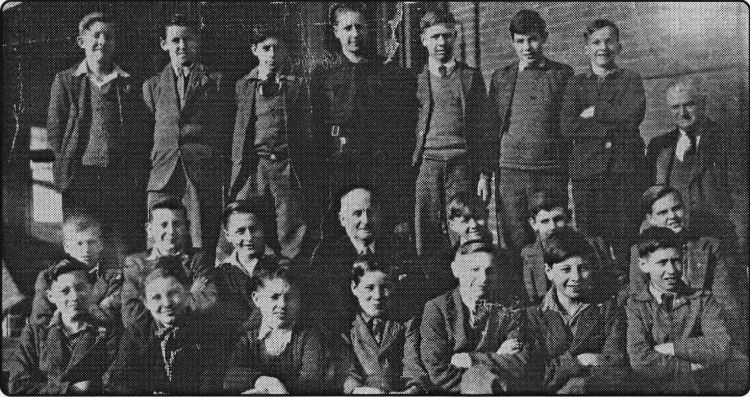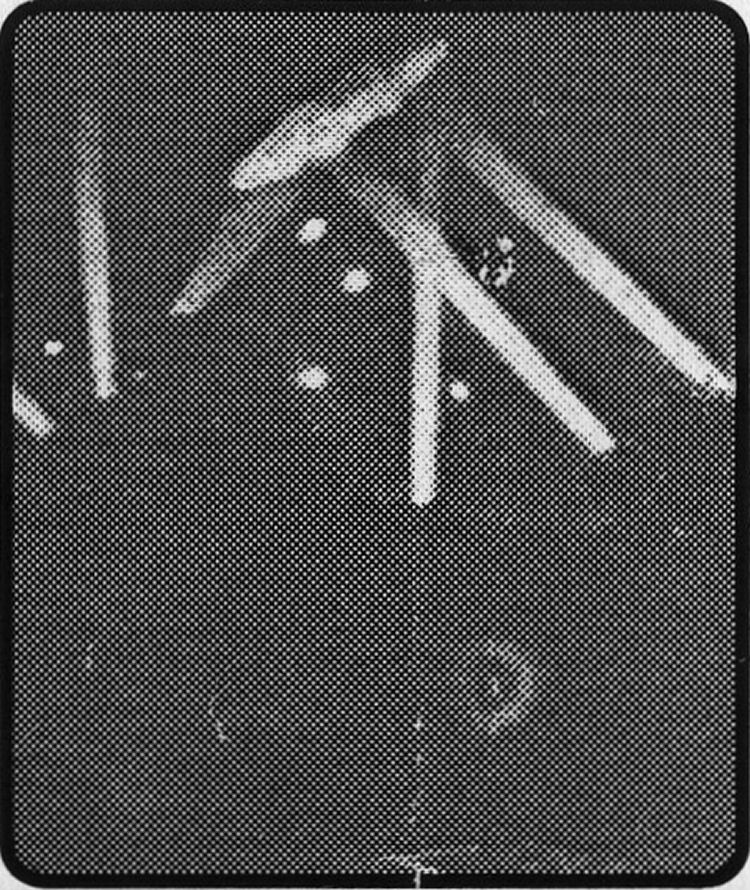
Published 30 January 2003


Affectionately nicknamed the "Dustbin Raiders," boys of Dover Road
School, Folkestone, in 1946, are the subject of a battered photo, right,
shown to me by reader Gerald Taylor, of St Mary's Road, St
Mary-in-the-Marsh.
The site of the old school is now occupied by a block of flats.
“Reg- Chapman is the recent owner of Sandg-ate hardware shop - now antiques.
Jimmy Matcham is well known for his heating- business, while Peter Woodsford,
my best wartime friend, retired as Folkestone & Hythe Swimming Pool
manager,” says Gerald.
“Jimmy did his National Service around the time I did mine, in January 1954.
But I have not seen any of the others since schooldays.” The class was Form
5, with Cyril Blunt the teacher, while the headmaster was Mr H. A. Wheeler.
Zeppelin search
Farmer Peter Harmer, of Rhodes Minnis is researching the subject of Oswald
Mosley’s pro-Nazis ‘Blackshirts’ who were once active in East Kent trying to
drum up support. He thinks a, Tony Witam had a meeting in Rendezvous Street,
about 1937.
I happened to mention this to Eric Hart, of Folkestone and he told me of a
stunt pulled off by the Blackshirts one night.
People woke the next morning to see a huge circle cut into the turf on the
hillside at Caesar’s Camp with a carefully crafted Blackshirt symbol of a
shaft of lightning.
There are known to have been some ‘Blackshirt’ sympathisers in the East Kent
area, and one or two of them in influential families.
While disgusted with they did, people could not help but admire the
craftsmanship which went into it, said Eric.
But, he added, Council workmen were quickly on the scene to replace the turf
and obliterate the offensive emblem.
He’s always wondered, he told me, why the Fascists didn’t use the nearby
flagpole on top of the hill to fly their Fascist flag!
Peter Harmer, who has written a book called “An Adventure in Bear Country,"
based on his experiences in Canada, is wondering if anyone remembers one of
the Germans’ massive Zeppelin airships passing over Shepway, about the same
time?
I should be interested to hear from any Memories reader who saw one in East
Kent.
In the Second World War Peter’s property was twice hit by ‘Doodlebugs’
causing loss of livestock, on what is now the site of kennels. But one
failed to explode, he says.
By a strange coincidence I came across a photo in a 1936 newspaper showing a
Zeppelin passing over Dover harbour at low
altitude, heading back to Germany.
Perhaps it passed over Folkestone too.
At the time troops at Dover were rehearsing for King’s Birthday celebrations
the following Tuesday. I wonder if the airmen took any aerial photos which
were later used to assist in the German offensive against the United Kingdom
only three years later!
Zeppelins first appeared over the UK in the First World War, when the enemy
used a dozen airships to attack Britain one night on September 2, 1916. A
pilot who shot one down got the VC.
MEMORIES reader Angela Carter contacted me about an interesting piece of
crested china she saw recently with the crest of Hythe on the front and was
intrigued by the name of the potter/pottery, J.W. Botolph. Has any reader
heard of a company of this name locally which has made small tourist pottery
items, she wonders. Angela also e-mailed me an old photo of the one-time
International's grocery store in Hythe with seven members of staff, all
wearing long aprons, lined up outside the shop.
ships, particularly Zeppelins, such as the one pictured left, are much
sought after. This is said to be a photo of a Zeppelin flying over Dover on
August 3, 1916, with criss-crossing searchlight beams and flashes of light
from anti-aircraft guns but I think an artist enhanced it!
Audacity!
FORM 5 of Dover Road School, Folkestone about 1946. Left to right, as far as
Gerald Taylor can remember, are back row, Gerald Taylor, Vic Poole, John
Donovan, Brian Couchman, Reg Chapman, O'Brian (?), John Flowers, teacher
Cyril Blunt; middle row, David Richards (?), Peter Woodsford, Gerald Blake,
H.A. Wheeler, Clifford Whitingstall, -?-, Len Court; front row: Jimmy
Stavely, John
Williams, Jimmy Matcham, Brian Moore, John Lewis.
POSTCARDS of air
 |
‘Wake up” and boost town’s attractions Councfl is urged
m qaa HERALD writer Felix said one of the X^Ujtown's greatest needs was
a "winter garden" or similar attraction to draw and keep visitors in the
town in the winter time. In this he was supported by Alderman George
Spurgen who warned the town to "wake up" and do something. Felix said
there had been 20 years of talking, but in the end the Town Council had
done nothing about it. This was a complaint that would be repeated by
some local people for many a year afterwards. A public mooting was held
at the Wampach Hotel to make more peo-
Ple aware there was an "Eglise Evangolique rancaiso" — a French Church —
in Folkestone. In the chair was General Sir W. Stirling KCB, supported
by the Revd HL Richmond Deck, M. lie Pasteur Braendli, the Swiss pastor
in London, and M Le Pasteur Ad. Peterson, French pastor in Folkestone,
who gave a brief history of the immigration of the French Huguenots to
the UK. Down in the Fishniarket fisherman Edward Saunders, 81, was
recalling a time "when there was no school where a lad could attend
under 10 old pennies a week," a tidy sum in the old days for poor
couples with big families.
|
Boxing promoters escape without paying the bill
ng>oLOCAL policemen laughed their heads ^«?OOoff at acts of violence
committed at the Leas Cliff Hall - but there was no need to worry, for
the crimes were all being committed by characters in "Uncle Peter's"
Punch and Judy Snow. This was one of several entertaining turns that
kept 150 children of local policemen and special constables in fits of
laughter at an annual Christmas party. Folkestone Town Council decided
to report boxing promoters to the British Boxing Board of Control after
a boxing tournament at the local football ground in which the once
celebrated British boxer Randolph Turpin appeared. The promoters were
reported to have left the town without settling a debt owing to the Town
Council. The Town Clerk said his investigations revealed the limited
com-
fany, who were the promoters, had no assets, hree out-of-town traders
were fined at Dymchurch court for selling mint seaside rock fiee of
sugar rationing coupons. The court hoard they were selling the rock at
more than twice the usual price of one shilling and eight old pence a
pound (less than lOp in modern currency) charging up to five shillings
and two old pence a pound (just over 25p.)
|
Tributes paid to councillor’s 50 years of public service
m qaaTRIBUTES to the 50 years' service to >L«/^!OFo!i«.-stone given by
Alderman George Spurgen, were paid by the Borough Engineer, Rear-Admiral
L.J. Stephens, when Sidney Street School was renamed "George Spurgcn
School" in his honour. First elected to serve on the local council in
1884, he served on numerous committees, on the School Board and on Kent
Education Committee from 1903, lod the town as mayor on a number of
occasions and had his public service recognised when he was made an
Honorary Freeman of the Borough, in 1924. North Council School was
renamed Mundella School after a pioneor in modern education, Mr A.J.
Mundella - once a household name in Folkestone and the Midlands.
Folkestone Museum published a 90-page guide to its 'treasures.' Felix
was looking back and wrote of the time bad weather led to part of the
Martello railway tunnel collapsing, and a landslip in the Warren —
pictured in Brian Hart's book just published, called "Folkestone's
Railways." It closed the coastline tracks for three months, 900 men
being employed to clear the obstruction.
|
No traffic in Hythe High St - demand 75% in survey
>a Q7Q HYTHE was the centre of attention JmSJ I Owhen draft proposals
for the futuro of the old Cinque Port town went on show, following a
survey of local people. Future proposals chiefly concerned shopping,
offices, industry and amenities. At one meeting a large majority called
for the banning of vehicles from the High Street. Shepway District
Council's development committee had voted against a pedestrianisa-tion
plan and councillors were forced to think again. Many wanted the
provisional scheme delayed until the effects of the Prospect Road scheme
could be judged and in this they were supported by the Herald editor.
Cllr George King was looking to slash council costs and wanted less
spent on entertaining visitors from Continental ports with which there
had been close links for decades. He said the money spent could take 10
people off the dole who could be set to work on the Capel Battery site
where they could open up an attractive tourist attraction and local
amenity - a much debated picnic site. It was an uneasy truce in the fire
dispute. Rival firemen agreed to bury the hatchet and carry 011 working
with non union colleagues, under threat of breach of contract. |
|



